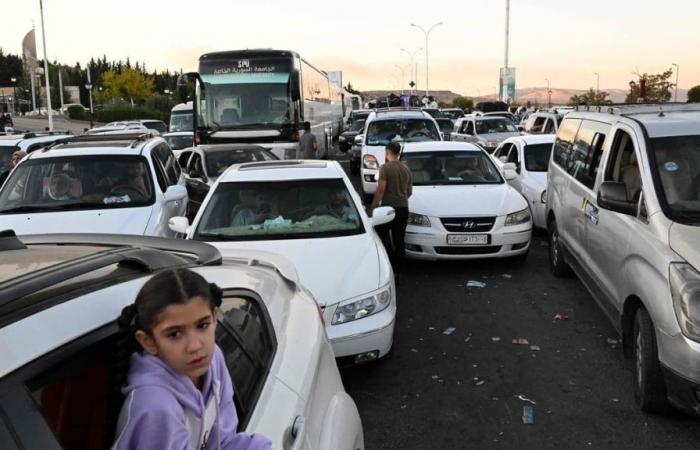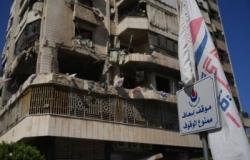The Israeli army carried out a raid on Friday in eastern Lebanon cutting a vital road axis with neighboring Syria, Lebanese authorities announced at a time when the head of diplomacy of Iran, an ally of Hezbollah, is arrived in Beirut.
• Also read: Three civilians killed in Israeli strikes in Damascus, Syrian state media says
• Also read: Syria: Israeli strike near the border with Lebanon, five soldiers killed
• Also read: Israeli army discusses ground incursion into Lebanon
Israel, at war with Hezbollah, accuses the Lebanese movement of transporting weapons via the main border crossing between Syria and Lebanon.
His army did not immediately comment on the strike, which comes after 310,000 people, mainly Syrians, fled the war between Israel and Hezbollah in Lebanon in recent days to go to Syria.
The Israeli strike follows a night of intense bombing on the southern suburbs of Beirut, a Hezbollah stronghold, where the movement’s leader Hassan Nasrallah was killed on September 27 in a devastating Israeli raid.
According to the American site Axios, which cites Israeli officials, Hachem Safieddine, potential successor to Hassan Nasrallah at the head of Hezbollah, would have been targeted by these bombings. The Israeli army, questioned by AFP, did not confirm.
According to the official Lebanese news agency ANI, “enemy fighter planes carried out a raid on the Masnaa area, leading to the cutting of the international road” between Syria and Lebanon. It is in this area located in the Bekaa valley that the main border post with Syria is located.
“The road leading to the main humanitarian crossing point for thousands of Lebanese towards Syria is now cut after an Israeli strike,” Lebanese Transport Minister Ali Hamieh told AFP.
Khamenei’s preaching
At the same time, the head of Iranian diplomacy Abbas Araghchi arrived in Beirut on Friday.
His visit comes as Iran’s Supreme Leader, Ayatollah Ali Khamenei, is scheduled to lead weekly prayers on Friday and deliver a sermon that could set the tone for Iran’s plans, following an Iranian missile attack Tuesday on Israel.
This rare speech must also come three days before the first anniversary of the unprecedented attack by the Palestinian Islamist movement Hamas on Israeli soil, which triggered the war in the Gaza Strip, on October 7, 2023.
The day after the start of this war, Hezbollah opened a front against Israel in support of Hamas, its ally. After exchanges of cross-border fire between the two camps, Israel has intensified its bombing campaign in Lebanon since September 23, targeting hundreds of Hezbollah targets, according to its army.
The Israeli army carried out intense raids on the night of Thursday to Friday against the southern suburbs of Beirut, devastated and deserted by its residents.
AFP footage showed giant balls of flame rising from the area, with thick smoke and flares.
“The ground shook beneath our feet. The sky lit up” because of the force of the strikes, Mohammed Sheaito, a 31-year-old taxi driver, told AFP.
“Severe blows”
The Israeli army said on Thursday it would continue to inflict “severe blows” on Hezbollah, after three days of ground fighting against the armed Islamist movement in southern Lebanon that cost the lives of nine of its soldiers.
According to official figures, nearly 2,000 people have been killed in Lebanon in a year of cross-border violence between Hezbollah and the Israeli army, including more than a thousand since September 23. The Lebanese government estimates the number of displaced people at around 1.2 million.
Nearly a year after the start of the war in Gaza, Israel announced in mid-September that it was moving most of its operations to the northern front, on the Lebanese border.
He affirmed that he would fight Hezbollah until “victory”, in order to allow the return of around 60,000 inhabitants of the border regions displaced for a year by the incessant rocket fire of the Shiite movement towards the north of its territory .
The now open war between Israel and Hezbollah is accompanied by an escalation between Israel and Iran, which fired nearly 200 missiles into Israeli territory on Tuesday, leading to cross threats of retaliation between the two countries and new fears concerning a conflagration in the Middle East.
Iran claimed to be responding to the assassination of Hassan Nasrallah and that of Ismaïl Haniyeh, the Hamas leader killed on July 31 in an attack in Tehran blamed on Israel.
18 dead in the West Bank
“We can avoid” a “total war” in the Middle East, US President Joe Biden said on Thursday.
He said he was “in discussions” with Israel about possible strikes against the oil installations of Iran, a country which is one of the ten largest oil producers. Oil prices jumped after this statement.
In the occupied West Bank, the Palestinian Authority announced Thursday evening the death of 18 people in an Israeli strike on the Tulkarem refugee camp. The Israeli army claimed to have “eliminated” a local Hamas leader, Zahi abd al-Razaq, alias Zahi Oufi.
An Israeli offensive continues in parallel on the Gaza Strip, devastated and besieged for a year.





